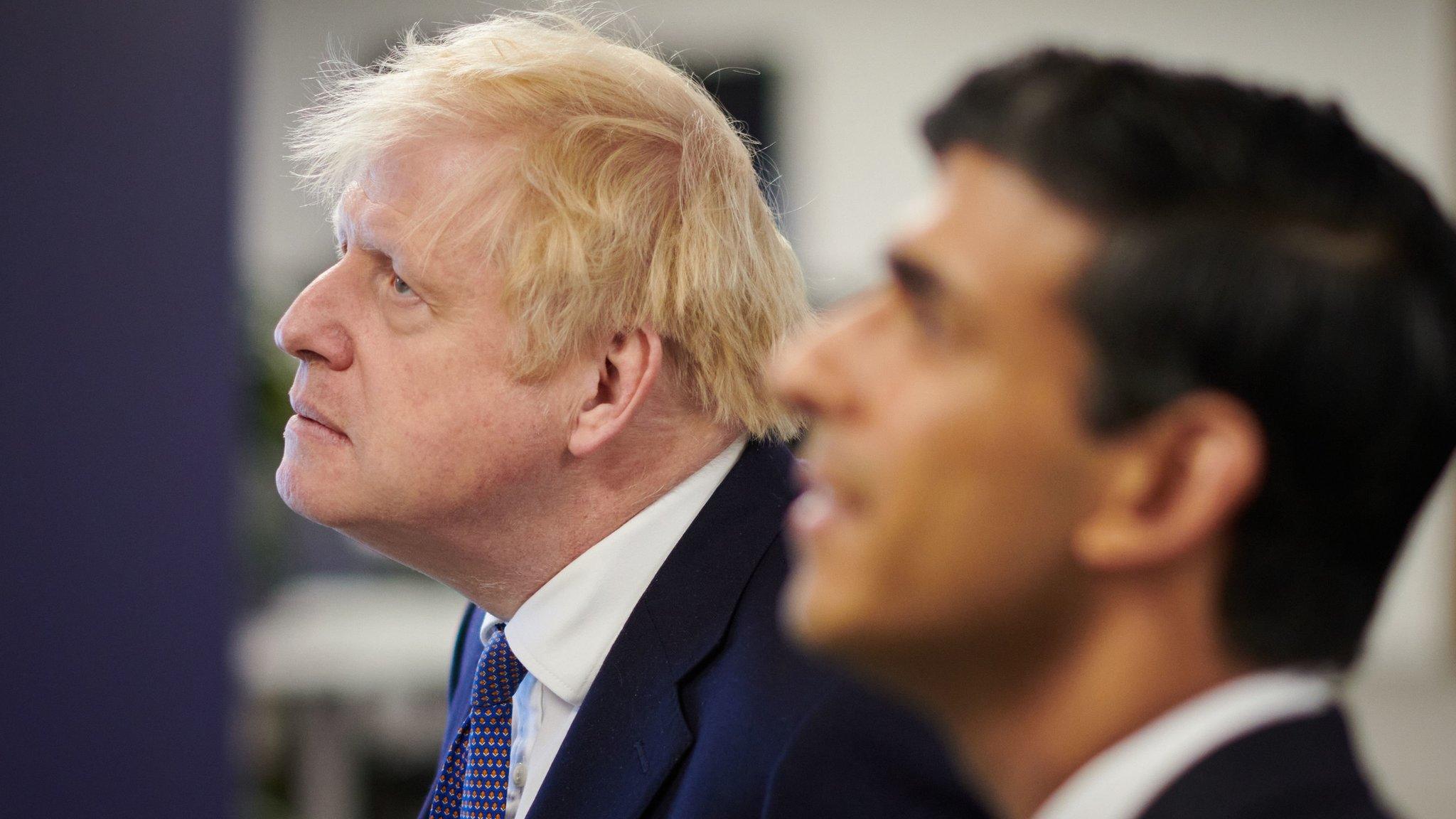Where does Boris Johnson's fine leave the Scottish Tories?
- Published
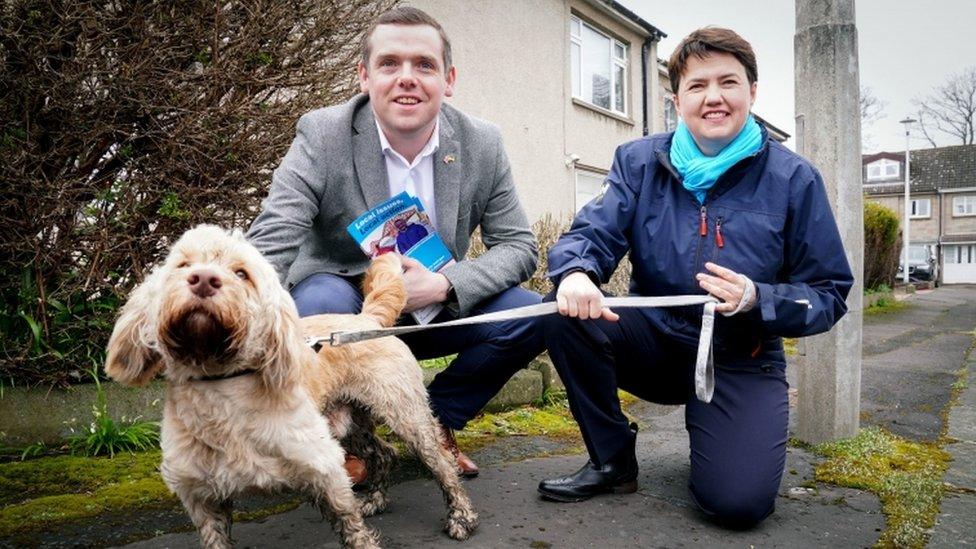
Douglas Ross and Ruth Davidson are still campaigning together despite being at odds over Boris Johnson's future
Scottish Conservative leader Douglas Ross now supports Boris Johnson, despite the prime minister being fined for attending a party during lockdown. Mr Ross has been on a journey which has left him at odds with his predecessor Ruth Davidson - but has he taken the rest of his party with him, and could he change position once more?

Boris Johnson has always been a bit of a problem for the Scottish Conservatives.
Keen observers of the 2021 Holyrood elections may recall that the prime minister featured in precisely zero Tory campaign events, while his face was splashed across the front of most SNP leaflets. It was clear which party saw him as an electoral asset.
And even before "partygate", Douglas Ross had been keen to put some clear blue water between himself and Mr Johnson.
Although he backed the winner in the final round of the Conservative leadership election in 2019, his initial support was for outsider Mark Harper.
He then resigned from a Scotland Office post over a different lockdown row - the Dominic Cummings road-trip - in what many saw as a calculated precursor to a leadership bid north of the border.
So it was not entirely unexpected when he was among the first Conservative MPs to demand Mr Johnson's resignation over the Downing Street parties, calling his position "untenable", and submit a formal no-confidence letter.
What Douglas Ross said in January 2022
Douglas Ross in January: "There is absolutely no way you can mislead parliament and think you could get off with that."
Mr Ross had arguably painted himself into a corner with his previous comments about Nicola Sturgeon, demanding the first minister's resignation before a series of inquiries into her adherence to the ministerial code had concluded - and before she had even given evidence.
There was certainly a political calculation at play too, though. Public sentiment was in a dark place in January, with some Covid restrictions still in force and the depths of lockdown fresh in the memory.
Mr Johnson's popularity in Scotland is well-established, and from an electoral perspective any risk in the move was tempered by the fact that true-blue Johnsonites were unlikely to turn around and vote for the SNP or Labour.
Two months is a long time in politics though. By March, Mr Ross had withdrawn his calls for Mr Johnson's resignation and his no-confidence letter.
What Douglas Ross said in April 2022
Douglas Ross in April: "It would not be right to change our leadership at the time we are supporting people in a war in Europe."
This was ostensibly due to events in Ukraine, with Mr Ross saying talk of a leadership contest should be "put on pause while there is a war in Europe".
Certainly the heart-wrenching images beaming back from the warzone, with accusations of war crimes and genocide flying, made the squabbles of politicians here seem comparatively petty.
But it was also clear by then that any momentum behind efforts to oust the prime minister had fizzled, with the belated intervention of the Met Police kicking potentially damning internal reports into the long grass.
This delay meant the trickle of backbenchers demanding resignation failed to swell into a flood, and with Covid restrictions being lifted it seemed that Mr Johnson's trademark approach of riding out a scandal until another story came along had worked.
With the two leaders due to appear together at a Scottish Tory conference, on a stage bedecked with banners reading "forward together", it was again not a huge surprise when the u-turn arrived.
The awkwardness of that handshake in Aberdeen has been intensified by the arrival of a fixed penalty notice at 10 Downing Street. But with no end to the war in sight, Mr Ross again finds himself somewhat boxed in by his own words.
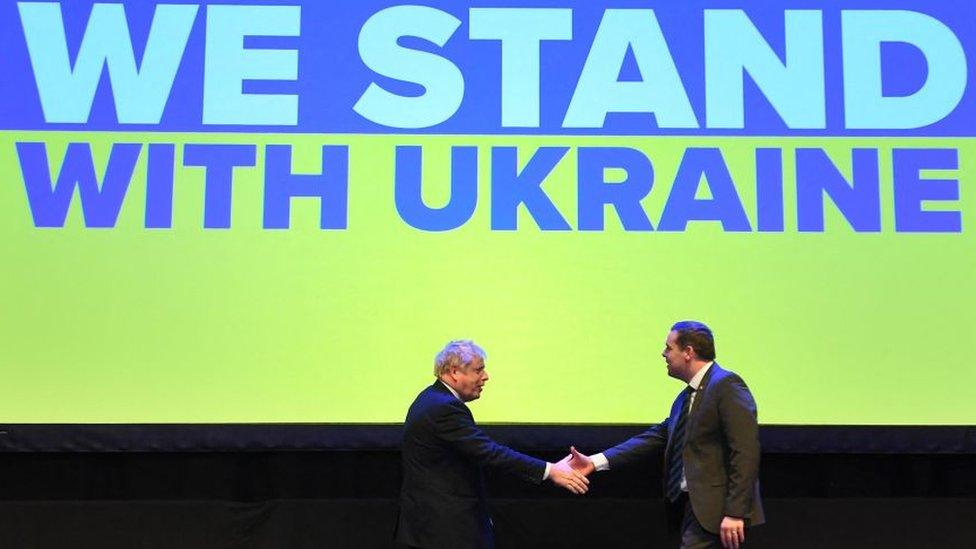
The two leaders appeared on stage together at the Scottish Tory conference in March
Mr Ross has certainly been on a journey, but has he taken his party as a whole with him?
When he initially demanded Mr Johnson's resignation, the leader was swiftly followed by the vast majority of his MSPs, who tweeted similar sentiments in a rather choreographed display of support.
There were clashes with the prime minister's entourage, with Jacob Rees-Mogg writing off Mr Ross as a "lightweight figure", but really the only Scottish Tory voice backing the PM was Scottish Secretary Alister Jack.
After Mr Ross changed his position, there were again tweets from senior MSPs - like the one from Murdo Fraser agreeing, external that it would be "deeply irresponsible to seek to change prime minister when the international situation is as it is".
But there is unease within the party about the position, and the painfully awkward way it has come about - particularly given the amount of time members are spending on the doorsteps as part of council election campaigning.
"Wouldn't you rather talk about bin collections" isn't going to cut it - grassroots Tory activists and candidates are going to face as many painful questions about this as the prime minister himself, and they know it.
This unease is underlined by former leader Ruth Davidson, who stuck to her guns and continued calling for Mr Johnson's head.
She managed to campaign side-by-side with Mr Ross in Edinburgh on Wednesday, but not without an elephant in the room. If Mr Ross thinks removing the prime minister would be welcomed by Vladimir Putin, has he told Ms Davidson she is aiding the Kremlin?
Allow X content?
This article contains content provided by X. We ask for your permission before anything is loaded, as they may be using cookies and other technologies. You may want to read X’s cookie policy, external and privacy policy, external before accepting. To view this content choose ‘accept and continue’.
What comes next?
Mr Ross's position is essentially "now is not the time". Some in Scottish politics may recall Theresa May using that phrase as a blunt "no" to an independence referendum, but it seems like Mr Ross really does mean "maybe later".
His stance has echoes of other letter-writing former rebels like Sir Roger Gale, who back Mr Johnson in the immediacy - but add, external that he cannot lead the Tories into the next election.
This does raise the question of why one would think someone unfit to be prime minister when there's not much going on - other than the painstaking recovery from a global pandemic and a crippling cost of living crisis - but think they are up to the job after all and effectively unsackable when a war breaks out in a friendly country.
Mr Ross has decided not to try to square that circle, instead dumping the toughest questions back on Mr Johnson's doorstep.
In particular, he says the prime minister will have to explain to MPs how his past statements to parliament can possibly accord with the reality confirmed by the Met Police.
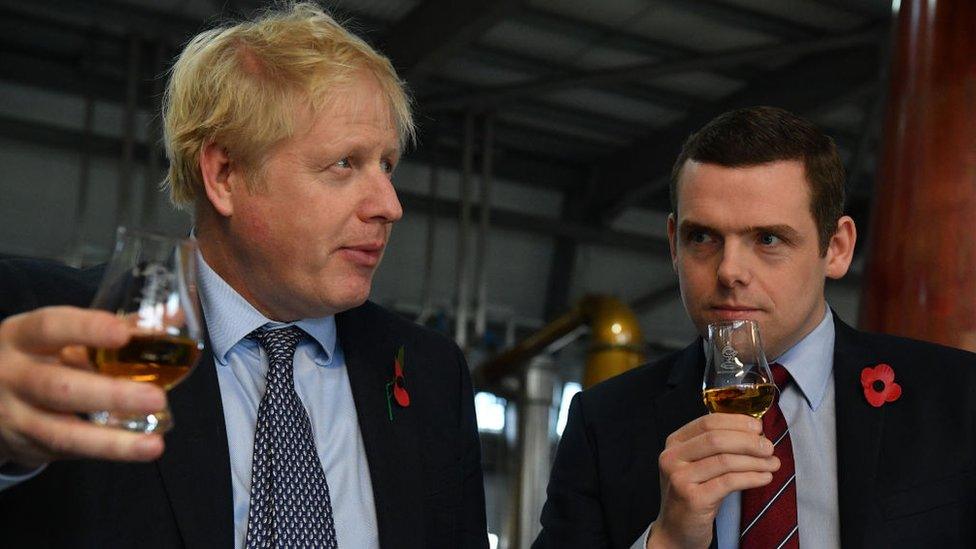
The two leaders have campaigned together in the past
So, will the Scottish Tory leader end up changing his position once again, and extend his u-turn into a full circle?
There are likely to be plenty of opportunities for this, because there are many ways in which the situation could still develop. Mr Johnson is by no means out of the woods.
First off, there could be more fines, with the police working their way through a lengthy list of parties one by one.
After these investigations conclude, we will see a full report from civil servant Sue Gray. She may be part of the government, but she didn't pull any punches in her interim findings, slamming "failures of leadership and judgement".
Parliament is in recess right now - not necessarily a good thing for Downing Street, with Tory MPs spending their days with angry constituents rather than the whips at Westminster - but when it reconvenes there are sure to be fireworks.
The Lib Dems are pushing for a formal vote of no confidence, which Mr Johnson would likely survive - but only via the acute discomfort of his own backbenchers.
And then there are May's local elections. If the Tories take a kicking at the ballot box, it could be the trigger for sceptical MPs to claim that "the people have spoken" and reorganise their rebellion.
Indeed in Scotland, Mr Ross could effectively use Mr Johnson as a shield for his own leadership in the event of poor results, and resume calls for his head at that point.
Each fresh development may feel like an endgame, but this row has weeks and perhaps months to run yet.
Related topics
- Published12 April 2022
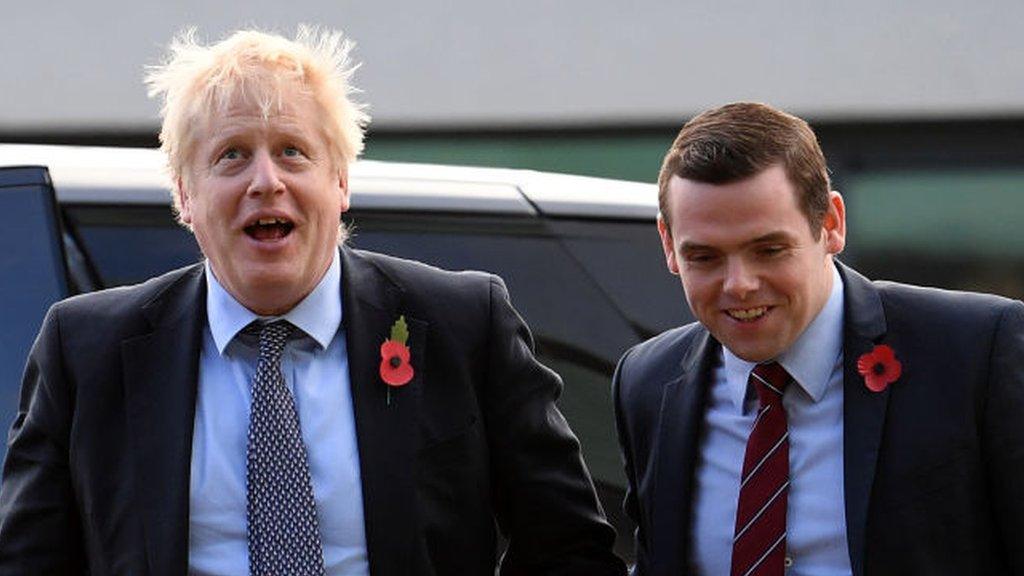
- Published13 April 2022
